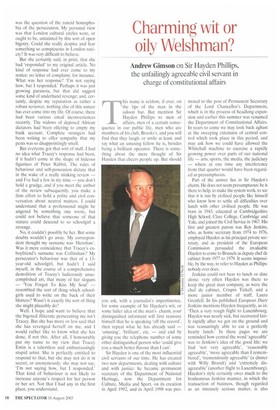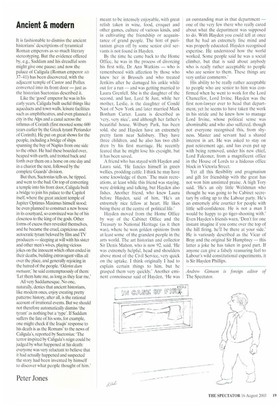Charming wit or oily Welshman?
Andrew Gimson on Sir Hayden Phillips, the unfailingly agreeable civil servant in charge of constitutional affairs
his name is seldom, if ever, on the lips of the man in the saloon bar. But mention Sir Hayden Phillips to men of affairs, men of a certain consequence in our public life, men who are members of his club, Brooks's, and you will find that they laugh, or smile at least, and say what an amusing fellow he is, besides being a brilliant operator. There is something about the mere thought of Sir Hayden that cheers people up. But should you ask, with a journalist's impertinence, for some example of Sir Hayden's wit, or some fuller idea of the man's charm, your distinguished informant will first reassure himself that he is speaking 'off the record', then repeat what he has already said — 'amusing', 'brilliant', etc. — and end by giving you the telephone number of some other distinguished person who 'could give you a much better flavour than I can'.
Sir Hayden is one of the most influential civil servants of our time. He has created two new departments, dealing with culture and with justice: he became permanent secretary of the Department of National Heritage, now the Department for Culture, Media and Sport, on its creation in April 1992, and in April 1998 was pro
moted to the post of Permanent Secretary of the Lord Chancellor's Department, which is in the process of headlong expansion and earlier this summer was renamed the Department of Constitutional Affairs. In years to come we may look back aghast at the sweeping extension of central control which took place in this period, and may ask how we could have allowed the Whitehall machine to exercise a rapidly growing power over parts of our national life — arts, sports, the media, the judiciary — where at one time any interference from that quarter would have been regarded as presumptuous.
Part of the answer lies in Sir Hayden's charm. He does not seem presumptuous: he is there to help, to make the system work, to see that it is run by civilised people like himself who know how to settle all difficulties over lunch with other civilised people. He was born in 1943, educated at Cambridgeshire High School, Clare College, Cambridge and Yale, and joined the Civil Service in 1967. His first and greatest patron was Roy Jenkins, who, as home secretary from 1974 to 1976, employed Hayden as his principal private secretary, and as president of the European Commission persuaded the invaluable Hayden to come to Brussels as deputy chef de cabinet from 1977 to 1979. It seems impossible, by the way, to refer to Hayden as Phillips: nobody ever does.
Jenkins could not bear to lunch or dine alone: very often Hayden was there to keep the great man company, as were the chef de cabinet, Crispin Tickell, and a more junior member of staff, Laura Grenfell. In his published European Diaty Jenkins mentions Hayden frequently, as in: 'Then a very rough flight to Luxembourg. Hayden was nearly sick, but recovered fairly rapidly after we got on the ground and was reassuringly able to eat a perfectly hearty lunch.' In these pages we are reminded how central the word 'agreeable' was to Jenkins's idea of the good life: we find 'not very agreeable', 'reasonably agreeable', 'more agreeable than I remembered', 'tremendously agreeable' (a dinner with Willy Brandt) and 'extremely disagreeable' (another flight to Luxembourg). Hayden's style certainly owes much to the bonhonaous Jenkins manner, in which the transaction of business, though regarded as an intensely serious matter, is also
meant to be intensely enjoyable, with great relish taken in wine, food, croquet and other games, culture of various kinds, and in cultivating the friendship or acquaintance of grand people. The hint of puritanism given off by some senior civil servants is not found in Hayden.
By the time he came back to the Home Office, he was in the process of divorcing his first wife, Dr Ann Watkins — who is remembered with affection by those who knew her in Brussels and who treated Jenkins after he damaged his ankle while out for a run — and was getting married to Laura Grenfell. She is the daughter of the second, and last, Lord St Just, while her mother, Leslie, is the daughter of Conde Nast of New York and later married Mark Bonham Carter. Laura is described as 'very, very nice', and although her father's beautiful house, Wilbury Park, has been sold, she and Hayden have an extremely pretty farm near Salisbury. They have three children, and he also has two children by his first marriage. He recently feared that he might lose his eyesight, but it has been saved.
A friend who has stayed with Hayden and Laura said, 'He fancies himself in green wellies, prodding cattle. I think he may have some knowledge of them,' The main recreations, at least while this friend was staying, were drinking and talking, but Hayden also fishes. Another friend, who knew Laura before Hayden, said of him, 'He's an extremely nice fellow at heart. He likes being there at the centre of political life.'
Hayden moved from the Home Office by way of the Cabinet Office and the Treasury to National Heritage (as it then was), where he won golden opinions from at least some of the grandest people in the arts world. The art historian and collector Sir Denis Mahon, who is now 92, said, 'He was extremely helpful, head and shoulders above most of the Civil Service, very quick on the uptake. I think originally I had to explain certain things to him, but he grasped them very quickly.' Another eminent connoisseur said of Hayden, 'He was an outstanding man in that department — one of the very few there who really cared about what the department was supposed to do. With Hayden you could tell at once that he had an extremely fine mind and was properly educated. Hayden recognised expertise. He understood how the world worked. Some people said he was a social climber, but that is said about anybody who is really rather acceptable to people who are senior to them. These things are very unfair comments.'
His ability to be really rather acceptable to people who are senior to him was confirmed when he went to work for the Lord Chancellor, Lord Irvine. Hayden was the first non-lawyer ever to head that department, yet he seems to have taken the work in his stride and he knew how to manage Lord Irvine, whose political sense was abominable and who also suffered, though not everyone recognised this, from shyness. Master and servant had a shared interest in art. He was asked to stay on past retirement age, and has even put up with being removed, under his new chief, Lord Falconer, from a magnificent office in the House of Lords to a hideous office block in Victoria Street.
Yet all this flexibility and pragmatism and gift for friendship with the great has not won him unstinted praise. A high Tory said. 'He's an oily little Welshman who thought he was going to be Cabinet secretary by oiling up to the Labour party. He's an extremely able courtier for people with little self-confidence. He is not a man I would be happy to go tiger-shooting with.' Even Hayden's friends warn, 'Don't for one instant imagine if you come over the top of the hill firing, he'll be there at your side.' He is variously described as the Vicar of Bray and the original Sir Humphrey — this latter a joke he has taken in good part. If anyone can give a falsely reassuring feet to Labour's wild constitutional experiments, it is Sir Hayden Phillips.
Andrew Gimson is foreign editor of The Spectator.











































































 Previous page
Previous page